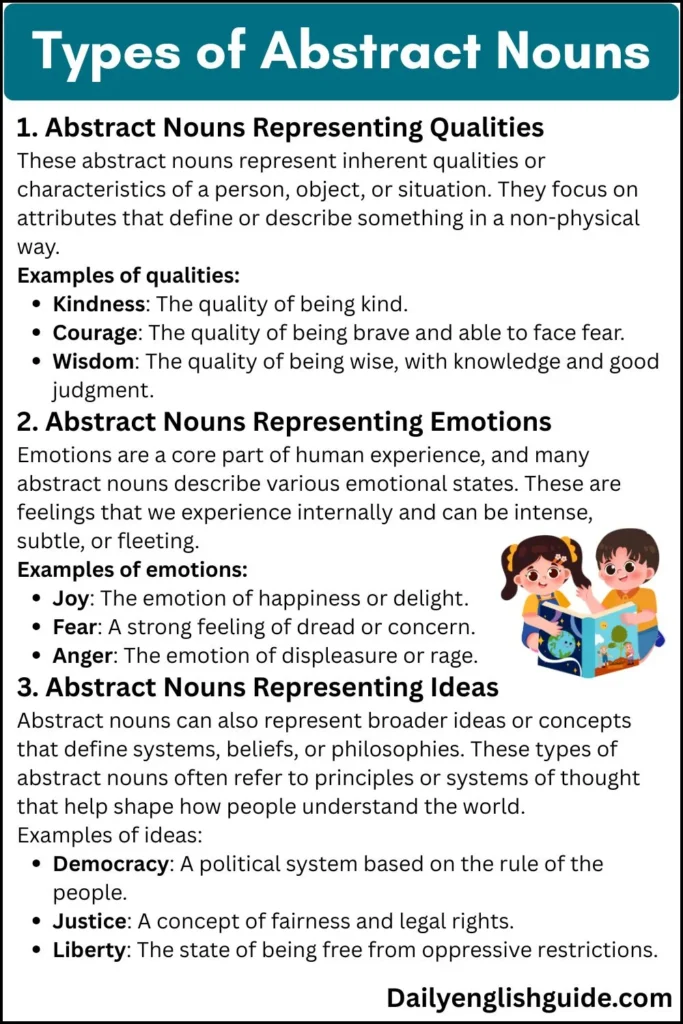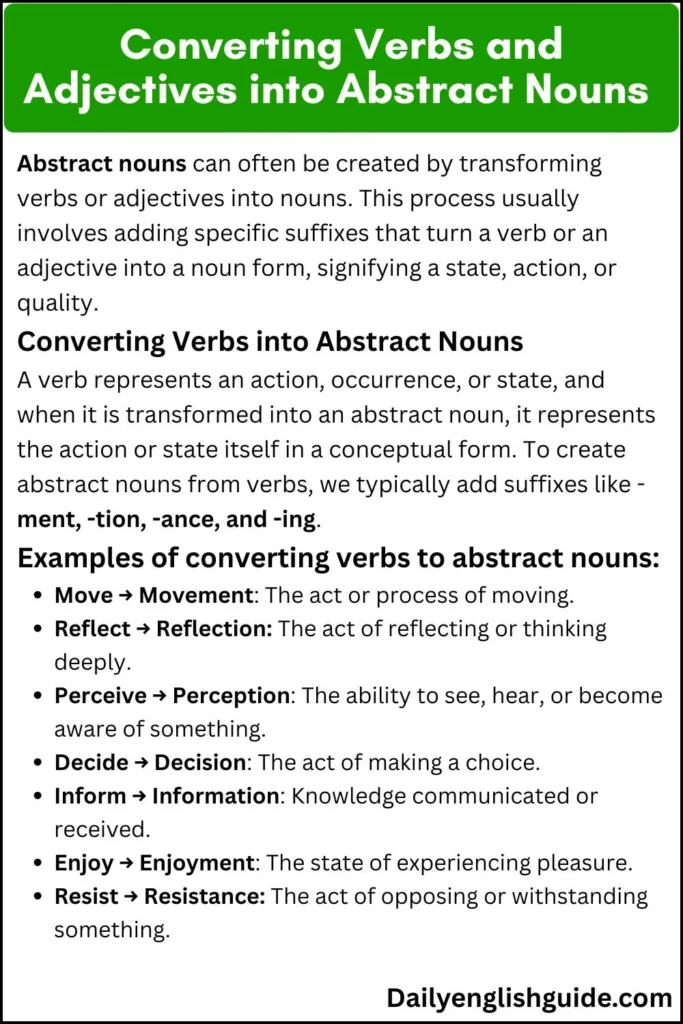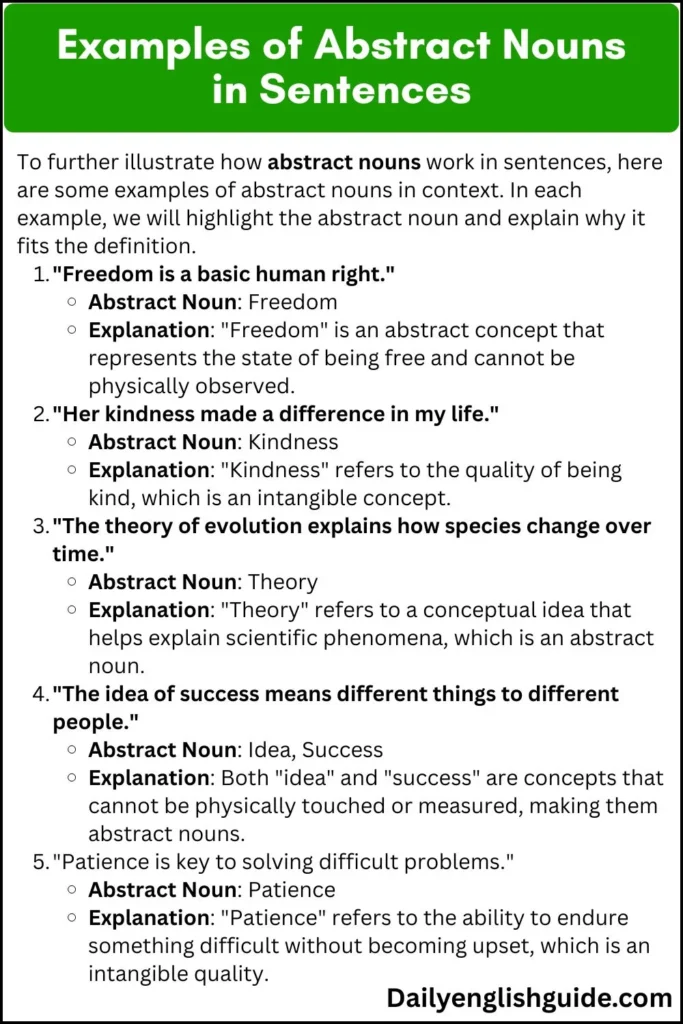Abstract nouns are an essential part of the English language, referring to concepts, qualities, emotions, and states of being that cannot be physically perceived. Unlike concrete nouns, which represent tangible objects you can touch, see, or measure, abstract nouns are intangible. These nouns deal with the non-physical aspects of life that shape our experiences, thoughts, and feelings.
In this guide, we’ll define what abstract nouns are, provide numerous examples, and explore how to form them from verbs and adjectives. Whether you’re a student, professional, or simply someone interested in perfecting your grammar, this article will help you understand and use abstract nouns more effectively.
Table of Contents
ToggleWhat Is an Abstract Noun?
An abstract noun is a noun that represents an idea, quality, or state rather than a physical object. These nouns deal with things that we cannot touch, see, hear, smell, or taste. They are the names of concepts, emotions, experiences, or states of being that exist in the realm of thought and understanding.
Key Characteristics of Abstract Nouns:
-
Intangible Nature: Abstract nouns do not have a physical form. You can’t touch or observe them directly.
-
Express Ideas or Concepts: They represent feelings, qualities, or states, such as love, justice, freedom, and courage.
-
Non-Concrete: They exist in thought, not in the physical world.
Some common examples of abstract nouns include happiness, freedom, beauty, and love. These words capture ideas and emotions that influence human behavior, but they do not have a tangible form.
For instance:
-
Freedom is a concept that refers to the state of being free but cannot be touched or seen.
-
Love is a powerful emotion that, although it can be expressed through actions or words, is not something you can physically touch or observe.

Types of Abstract Nouns
Abstract nouns can be categorized into different types based on what they represent. These include qualities, emotions, ideas, states of being, and experiences. Each type provides a unique perspective on how abstract concepts are used in the language.
1. Abstract Nouns Representing Qualities
These abstract nouns represent inherent qualities or characteristics of a person, object, or situation. They focus on attributes that define or describe something in a non-physical way.
Examples of qualities:
-
Kindness: The quality of being kind.
-
Courage: The quality of being brave and able to face fear.
-
Wisdom: The quality of being wise, with knowledge and good judgment.
Important Note: Qualities often describe virtues or traits that cannot be seen but can be felt or observed through actions or behavior.
2. Abstract Nouns Representing Emotions
Emotions are a core part of human experience, and many abstract nouns describe various emotional states. These are feelings that we experience internally and can be intense, subtle, or fleeting.
Examples of emotions:
-
Joy: The emotion of happiness or delight.
-
Fear: A strong feeling of dread or concern.
-
Anger: The emotion of displeasure or rage.
These emotions help convey the complexities of the human condition, yet they are not physical entities you can touch or measure.
3. Abstract Nouns Representing Ideas
Abstract nouns can also represent broader ideas or concepts that define systems, beliefs, or philosophies. These types of abstract nouns often refer to principles or systems of thought that help shape how people understand the world.
Examples of ideas:
-
Democracy: A political system based on the rule of the people.
-
Justice: A concept of fairness and legal rights.
-
Liberty: The state of being free from oppressive restrictions.
These concepts are powerful and influential but can never be physically experienced in the same way as tangible objects.
4. Abstract Nouns Representing States of Being
This category includes abstract nouns that refer to conditions or states that describe existence or situations. They convey how something exists or feels at a particular moment.
Examples of states of being:
-
Health: A state of well-being or being free from illness.
-
Existence: The state of being alive or present.
-
Freedom: The state of being free from confinement or oppression.
These nouns are used to describe various forms of existence and can encapsulate the quality of life or being.
5. Abstract Nouns Representing Experiences
Abstract nouns can also reflect experiences or events that one undergoes. These experiences are intangible because they exist within our perceptions and memories.
Examples of experiences:
-
Childhood: The experience of being a child, which includes various memories and stages of growth.
-
Journey: The experience of traveling or going through a process.
-
Adventure: An exciting or unusual experience that often involves risk or newness.
These experiences shape our lives but cannot be physically touched, though they may leave lasting impressions.

Converting Verbs and Adjectives into Abstract Nouns
Abstract nouns can often be created by transforming verbs or adjectives into nouns. This process usually involves adding specific suffixes that turn a verb or an adjective into a noun form, signifying a state, action, or quality.
Converting Verbs into Abstract Nouns
A verb represents an action, occurrence, or state, and when it is transformed into an abstract noun, it represents the action or state itself in a conceptual form. To create abstract nouns from verbs, we typically add suffixes like -ment, -tion, -ance, and -ing.
Examples of converting verbs to abstract nouns:
-
Move → Movement: The act or process of moving.
-
Reflect → Reflection: The act of reflecting or thinking deeply.
-
Perceive → Perception: The ability to see, hear, or become aware of something.
-
Decide → Decision: The act of making a choice.
-
Inform → Information: Knowledge communicated or received.
-
Enjoy → Enjoyment: The state of experiencing pleasure.
-
Resist → Resistance: The act of opposing or withstanding something.
Converting Adjectives into Abstract Nouns
Adjectives describe qualities or states of being, and when converted into abstract nouns, they often represent the essence or state of that quality. By adding suffixes such as -ness, -ity, and -ity, adjectives can become abstract nouns.
Examples of converting adjectives to abstract nouns:
-
Brave → Bravery: The quality of being brave.
-
Weak → Weakness: The state of being weak.
-
Happy → Happiness: The state of being happy.
-
Sad → Sadness: The state of being sad.
-
Honest → Honesty: The quality of being truthful.
-
Possible → Possibility: The state or fact of being possible.
-
Independent → Independence: The state of being independent or free from control.
-
Silent → Silence: The state of being silent or without sound.
Words That Can Be Both Nouns and Verbs
Some words can function as both nouns and verbs without changing their form. These dual-function words allow for flexibility in language, depending on how they are used in sentences. In these cases, context plays a key role in determining whether the word is being used as an abstract noun or a verb.
Examples of words that can be both nouns and verbs:
-
Love:
-
As a verb: “I love the way she dances.”
-
As a noun: “Love is a powerful emotion.”
-
-
Aim:
-
As a verb: “You need to aim for success.”
-
As a noun: “What is your aim in life?”
-
-
Battle:
-
As a verb: “They will battle for the championship.”
-
As a noun: “The battle was intense and long-lasting.”
-
-
Play:
-
As a verb: “Children play outside every day.”
-
As a noun: “The play was performed beautifully by the cast.”
-
These examples illustrate how words can adapt to different roles in sentences, either as a verb indicating action or as a noun expressing a concept, action, or state.
Identifying Abstract Nouns in Sentences
One of the key challenges when learning about abstract nouns is recognizing them in context. Abstract nouns often appear in sentences as they represent feelings, concepts, or experiences. Below are some strategies and examples to help you identify abstract nouns in various sentences.
Tips for Identifying Abstract Nouns
-
Look for Words That Represent Ideas or Feelings
Abstract nouns typically describe things that are conceptual or emotional rather than tangible. If the word describes an idea or a state of being, it’s likely an abstract noun. -
Check for Non-Physical Elements
Abstract nouns will never describe something you can physically touch, see, or hear. They deal with things that exist mentally or emotionally. -
Look for Nouns with Suffixes
Many abstract nouns are formed by adding suffixes like -ness, -ity, -ment, and -tion to adjectives or verbs. This is a clear indicator that the noun is abstract.

Examples of Abstract Nouns in Sentences
To further illustrate how abstract nouns work in sentences, here are some examples of abstract nouns in context. In each example, we will highlight the abstract noun and explain why it fits the definition.
-
“Freedom is a basic human right.”
-
Abstract Noun: Freedom
-
Explanation: “Freedom” is an abstract concept that represents the state of being free and cannot be physically observed.
-
-
“Her kindness made a difference in my life.”
-
Abstract Noun: Kindness
-
Explanation: “Kindness” refers to the quality of being kind, which is an intangible concept.
-
-
“The theory of evolution explains how species change over time.”
-
Abstract Noun: Theory
-
Explanation: “Theory” refers to a conceptual idea that helps explain scientific phenomena, which is an abstract noun.
-
-
“The idea of success means different things to different people.”
-
Abstract Noun: Idea, Success
-
Explanation: Both “idea” and “success” are concepts that cannot be physically touched or measured, making them abstract nouns.
-
-
“Patience is key to solving difficult problems.”
-
Abstract Noun: Patience
-
Explanation: “Patience” refers to the ability to endure something difficult without becoming upset, which is an intangible quality.
-
Activity: Identifying Abstract Nouns
Try identifying abstract nouns in the following sentences. Remember, abstract nouns represent concepts, emotions, or qualities, and they are not tangible.
-
“Justice is blind to personal biases.”
-
“Hope is essential in overcoming adversity.”
-
“Her generosity has earned her respect.”
-
“He achieved greatness through determination.”
-
“Curiosity drives scientific discovery.”
Once you’ve identified the abstract nouns, check your answers to ensure you correctly spotted them.
Frequently Asked Questions (FAQs) about Abstract Nouns
As abstract nouns can be a challenging topic for many learners, it’s important to address common questions and provide clarity on their usage. Here are some frequently asked questions about abstract nouns that may help deepen your understanding.
Q1: What is the difference between abstract nouns and concrete nouns?
-
Abstract Nouns: These refer to intangible concepts, ideas, or qualities that cannot be perceived by the five senses. Examples include love, justice, freedom, and happiness.
-
Concrete Nouns: These represent physical objects or things that can be perceived by the senses, such as a book, dog, chair, or tree.
Summary: Abstract nouns deal with things we cannot see or touch, whereas concrete nouns refer to physical things we can interact with in the real world.
Q2: Can a word be both an abstract noun and a concrete noun?
Yes! Some words can function as both abstract nouns and concrete nouns, depending on the context in which they are used. For example:
-
Change:
-
As an abstract noun: “The change was difficult to accept.” (Refers to the concept of transformation.)
-
As a concrete noun: “I need some change for the bus fare.” (Refers to small coins or currency.)
-
Q3: Can abstract nouns be pluralized?
Yes, many abstract nouns can be pluralized, although some may sound unusual or are rarely used in the plural form. For example:
-
Love (abstract noun) → Loves (used in certain contexts, such as in literature: “The many loves of Romeo.”)
-
Experience (abstract noun) → Experiences (refers to multiple events or occurrences).
However, not all abstract nouns are commonly pluralized. It’s important to consider the context and whether the plural form feels natural.
Q4: How can I improve my use of abstract nouns in writing?
To improve your use of abstract nouns in writing, consider the following tips:
-
Practice identifying them in sentences: Regularly identify abstract nouns in reading materials to become more familiar with their usage.
-
Use abstract nouns to express deeper ideas: Incorporate abstract nouns to convey complex thoughts and feelings in your writing.
-
Use descriptive language: Since abstract nouns describe non-tangible things, pairing them with vivid adjectives or actions can make your writing more engaging.
Q5: Are there any abstract nouns that have multiple meanings?
Yes, some abstract nouns can carry multiple meanings depending on context. For example:
-
Light:
-
As an abstract noun: “She brought light into my life.” (Refers to happiness or positivity.)
-
As a concrete noun: “The light from the lamp is very bright.” (Refers to the physical brightness of light.)
-
Understanding the context of a sentence is essential to interpreting the meaning of such abstract nouns.
Conclusion
Abstract nouns are fundamental to the English language, allowing us to express complex ideas, emotions, and qualities that are not directly measurable or tangible. From love to justice, freedom to wisdom, these intangible concepts shape our thoughts and interactions in powerful ways. By mastering abstract nouns, you can enhance both your understanding and communication in English.
